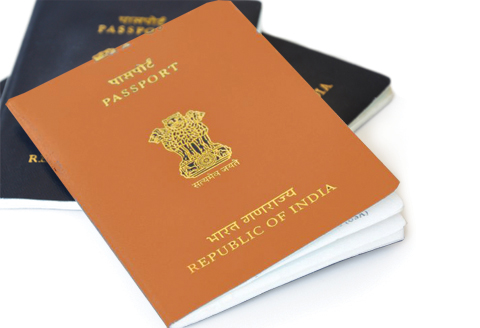KUWAIT: A decision by the Indian government to issue passports in two colors - blue and orange - and leave the address page of the document blank has created a lot of consternation among Indian expats in Kuwait. According to new rules, Indians who require emigration clearance (ECR) - those who have not passed 10th grade - at airports, will now carry orange passports, while those who do not need emigration clearance (ECNR), will carry the blue ones. The government has also decided to keep the last page of the passport blank in accordance with the recommendations of a committee set up to look into requests by single mothers that the name of the father not be mentioned in their child's passport.
Many expats Kuwait Times spoke to said this decision will widen the social and economic divide in India and lead to discrimination against poor and illiterate workers. "This is an ill-conceived idea. If the decision is implemented, it will render millions of Indians second-class citizens. An orange passport will in effect become a license to harass an Indian migrant worker in a foreign country," said Sam Painummoodu, a social worker, writer and a member of the newly-constituted Loka Kerala Sabha (LKS). According to Painummoodu, the decision will practically divide citizens and as such it is 'unconstitutional'.
While the government claims that the new orange passports are expected to protect vulnerable laborers from exploitation abroad, it is feared that that the orange and blue color coding will only lead to discrimination against migrant workers abroad. Many fear that the color coding will lead to the treatment of Indian citizens as 'equal but separate'.
India is the world's largest exporter of migrant labor. According to estimates, one in 20 migrant workers worldwide are Indian-born - a number that has rapidly risen over the past 25 years. Currently, more than 900,000 Indians are residing in Kuwait, of which more than 60 percent are unskilled laborers.
"We are dismayed by the decision. Whatever may be the intention behind the move, it will only lead to further exploitation of expat laborers. Moreover, all Indians must be treated as one people," said B S Pillai, General Secretary of the Overseas Indian Cultural Congress, Kuwait.
Presently, the last page of an Indian passport lists the names of father/legal guardian, mother, spouse, address, and whether the holder is in the 'Emigration Check Required' category. With the last page blank, passports will most likely cease to be proof of valid address, and under the changed system, those with ECR status will be issued orange passports.
"It is an unfair decision. For an expatriate, a passport is not just a travel document alone. It is important that a passport must contain such relevant information," said Sharafuddeen Kanneth, an expat social worker and a member of the LKS. He also said the decision to issue blue and orange color passports to Indians is 'discriminatory'.
According to the government, unskilled migrants are required to get clearances from the Indian government before traveling to a number of countries and the orange passports for ECR category migrants are devised to ensure protection for them.
Anand Kapadia, Vice Chairman of the Indian Business Council, however, sees no serious problems emanating out of the government's decision. "In most Western countries, the passports do not carry names of the parents, relatives or spouse. The home address is also not mentioned in the passport. It works fine because the biometric system is foolproof and fine," he commented. However, Kapadia said it is discriminatory that the government issues orange passports to the ECR category of citizens and blue ones for the ECNR category. He hoped that the decision will not lead to major inconvenience or chaos.
By Sajeev K Peter











